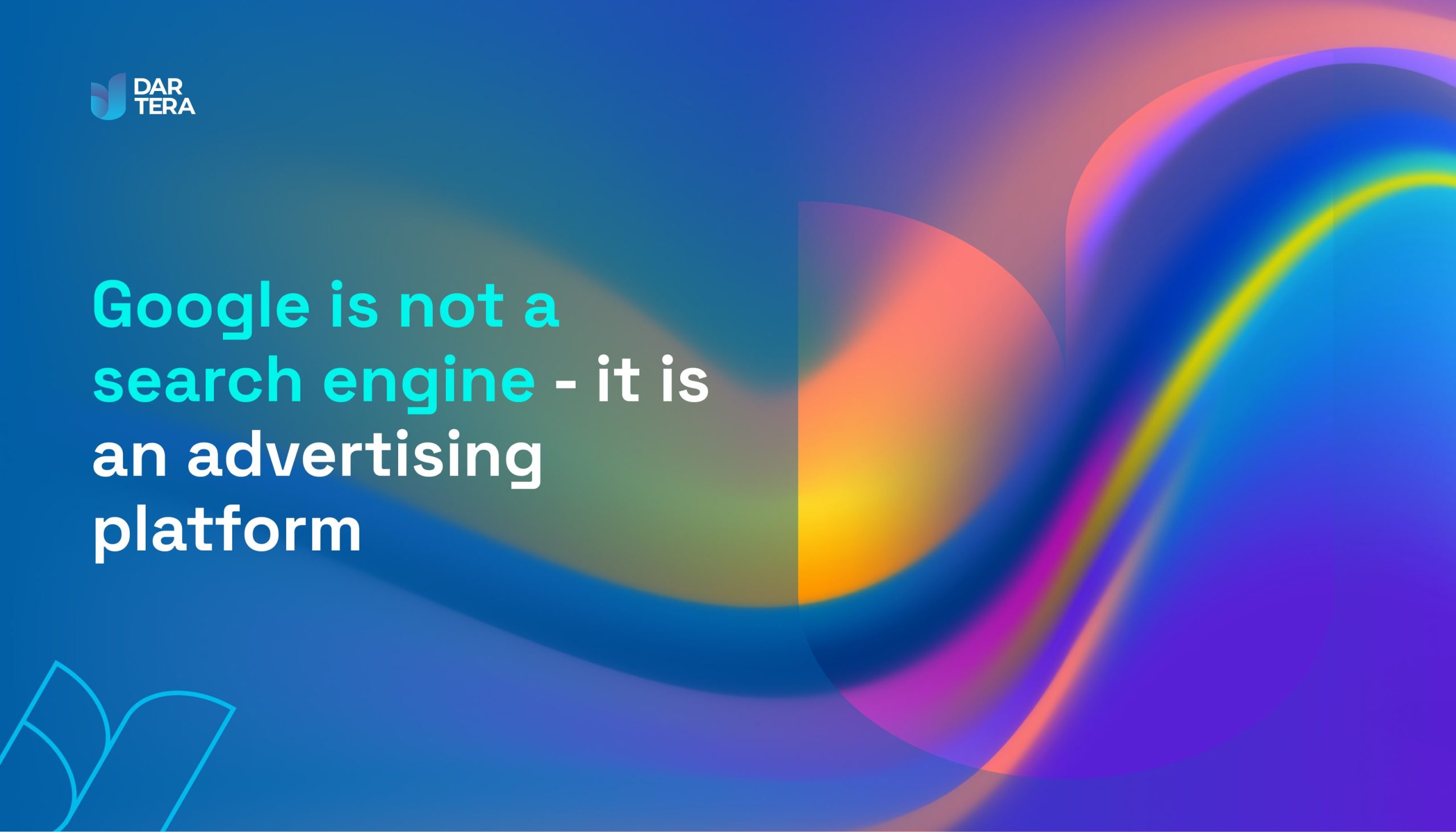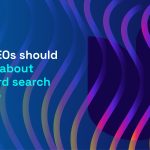Google is not a search engine – it is an advertising platform

We know it sounds wrong. Google, a word so often used interchangeably with "search" that it was added to the Oxford English Dictionary as a verb in 2006, meaning "to search for information ... on the Internet." Google is to search what Kleenex is to facial tissues and Xerox is to copy printing. It is synonymous with the service it provides. Why would anyone say otherwise?
Because ultimately, the purpose, priority and true form of Google is an advertising platform. The search functions are only a means to this end.

You are what you do
Think of it this way: When someone earns his living working in a zoo, we call him a zookeeper. The person you call to fix a leak is a plumber. When you meet someone at a party, one of the first questions you're likely to ask - and be asked - is some version of "What do you do?". And that's how you define that person. The question is not, "How do you do your job?" or "What do you do for a living?" but simply, "What is your job?". If you met Google at a party and asked the same question, the best answer would be, "I'm in advertising."
And this simple truth has significant implications for anyone who wants to appear in Google's search results - or thinks they deserve to. Most people will say, "Google is a web search engine, and I have a website, so my website should show up in Google's search results." That is the completely wrong way of looking at it.
To be clear, whether you're in marketing, advertising, SEO, SEM, or just trying to keep your small business afloat in a competitive market, Google has no interest in your success or visibility in organic search results. You're on your own - unless you buy ad space.

How does Google make money?
Simply put, Google makes money by selling advertising space in its search results (SERPs).
There's an old observation from the 1970s that's especially true in the modern, digital world: if something is free, you are the product. Google offers free Web search services to turn its users into a commodity: an audience for advertisers - that's the core of Google's business model, which, while almost unprecedented in its scope and sophistication, has fundamentals as old and familiar as the wheel. It's content marketing - and search results are the content that draws you in and makes you feel like you got something valuable for free, so you'll come back for more.
In many ways, Google is not that different from newspapers, magazines, radio or television. All the information, entertainment, and media they provide to the public (often for free) is really just a means to attract attention and build audience loyalty. All these media use this audience to sell advertising: by the centimeter, by the second, or, as in the case of Google, per click and keyword.
Pay Per Click (PPC) Advertising
When you buy a television commercial, how do you know if it works? By and large, you (and the sellers of the advertising) are relying on correlative data: A certain number of people are likely to see the ad, and a certain percentage of the orders you receive after the ad airs are likely to be due to the ad. Sometimes a call to action is appended to the end of the ad: "Mention this ad and get an extra discount!" But it's hard to know for sure what's working or who's even seeing the ad.
Because Google is a Web-based company, it can go even further: It can measure exactly how many people search for something, how many click on an ad, and how many of those who click then actually buy something, sign up for a mailing list, or otherwise "convert" from searcher to customer. So when you buy an ad in Google search results, you're not paying for the ad space itself, but for the clicks your ad gets because it's placed in front of searchers. Hence the term Pay-Per-Click or PPC.
AdWords
At first glance, PPC seems like a pretty fair way for Google to turn its global audience into a commodity for advertisers. But some markets and industries are more competitive than others. Some customers are more profitable, and some keywords are more likely to be used by conversion-ready customers than others.
This is where AdWords comes in. AdWords is basically eBay, but for keywords and not for products. Advertisers use Google's AdWords to identify keywords they want to be associated with in search results and bid to have their ads appear at the top of the page. The more advertisers bid on a keyword, the more the price per click is driven up.

Multiply AdWords and PPC by the number of people searching Google every minute of every day, and you can imagine how lucrative the search engine marketing system is for Google. This is the largest and most reliable audience of any content marketing media or platform in history - and Google knows more about its users than any television focus group or magazine subscription service could dream of.
Google revenue and audience size
Google parent company Alphabet reported total revenue of just over $39 billion for the fourth quarter of 2018. Of this, $27 billion came from Google advertising - about 69% of all revenue was advertising sales. Although both Alphabet and Google are constantly growing, diversifying and developing new revenue streams, the ratio of revenue to Google advertising has been fairly constant in the past. Sales also increased 21% to 24% annually between 2017 and 2018.
Judging by the numbers, Google is an advertising company, and it's getting bigger.
Google vs Television
To put Google's purpose and business model in perspective, consider the most popular sitcom on American television in 2018: The Big Bang Theory.
Big Bang airs on the CBS network, which generated $4 billion in total revenue in the fourth quarter of 2018. Like Google, CBS makes its money by selling advertising time and attracting viewers with content. Big Bang's ratings peaked at nearly 13 million viewers in the fourth quarter of 2018 - significantly more than any other program in that time slot.
Google averages more than 3.5 billion search queries per day, making it the platform of choice for around 90% of all searches on the Internet. Granted, not all of these searches are lucrative places to place an ad.
A search for "Who is the current U.S. president?" doesn't lend itself to a marketing message; people just want a name. But if you figure that only one in 100 searches contains ads, that means Google still serves three times as many people (35 million) on an average day as the most-watched sitcom does on its best day.
And unlike sitcoms, which viewers may pay attention to (or which broadcasters accurately track and measure), people use Google search deliberately and with the intention of actively engaging with the results, and Google tracks all of their behavior.

Google is not a monopoly
In the truest sense of the word, Google is not a monopoly, as there are numerous other search engines available to any user with Internet access - Bing, Yahoo and Yandex are the most popular, apart from country-specific platforms such as Baidu in China.
But more to the point, Google is not an anti-competitive company when it comes to search. Per the Federal Trade Commission (FTC), antitrust laws are written to “prohibit conduct by a single firm that unreasonably restrains competition by creating or maintaining monopoly power.”
But more importantly, Google is not an anti-competitive company when it comes to search. According to the Federal Trade Commission (FTC), the antitrust laws are designed to "prohibit conduct by a single firm that unreasonably restrains competition by creating or maintaining monopoly power."
The FTC goes on to qualify the "unreasonable" portion of the law by stating that "the monopolist may compete in a manner that benefits consumers through greater efficiency or a unique set of products or services" and "...the intentional acquisition or maintenance of that power as opposed to growth or development as a result of a superior product, business acumen, or historical accident."
In other words: If you outperform the competition because you are inherently better, luckier, or both, you are not breaking the law. They simply win the game. Both luck and true superiority are key to Google's dominance in web search.

Google must compete for its audience
Google is constantly optimizing and updating its search services, adding new features to stay relevant, engaging and useful. In television, shows are canceled if they can't find and keep the audience that advertisers want to reach. Google is no different - the company must evolve to deliver dynamic, relevant search results so users use it again and again. Other search engines did not evolve as quickly or effectively when the World Wide Web first became a reality, so Google has managed to make itself synonymous with search.
All of this is of great importance to companies advertising on Google, marketers trying to rank content organically, or both. Google doesn't care about your website, your brand, your content, or your SEO strategy on an individual level. It focuses on crawling, indexing and analyzing the entire World Wide Web to constantly and consistently deliver the best results. You don't have a right to rank or appear in the SERPs - you need to provide value to searchers or you won't help Google reach and engage its users.
What it takes to rank organically
To use the example of television again: If you want to be seen by viewers of The Big Bang Theory, you essentially have two choices:
- Join the Cast. Appear on the show yourself as a guest star, background extra, or new character. In other words, be part of the content viewers tune in for.
- Pay for commercials during the show and hope viewers continue watching during commercial breaks. In other words: Use the content they tune in for.
It's not easy for actors to get on TV, let alone the most popular sitcom of the day. You need either great name recognition and cultural cachet or incredible skill and broad appeal, and even then you have to gain the attention and support of the right people (producers, directors, other actors and industry insiders) to even have a chance at a role.
It's exactly the same with search: there are many websites looking for attention. In order to appear in the rankings, your website must have either a high level of awareness (domain authority and existing traffic/participation) or incredible appeal (great content and thematic expertise).
Even if you have a combination of these things, you still need to gain the attention and support of the right people (online, that means getting backlinks to your content from other trusted, authoritative sites) to have any chance of ranking for a particular search query.
The alternative to fighting your way to the top of the SERPs is to bid on AdWords and pay to have your ad displayed, but that's still competitive and potentially expensive.

Content marketing is not free, fast or easy
Google is an advertising platform. It works by attracting a huge audience through its search tool and features, but that's just a new and interactive form of content marketing.
At the end of the day, it's better to think of Google as the latest addition to the world of news and entertainment - and to recognize that Google, like any other form of media, must struggle to reach and retain its audience. You can't expect to rank just because you have a website or have done a little SEO to get discovered. Many actors move to L.A. every year, but few ever become famous or become household names.
The good news is that it's still possible to get your content placed - much easier than for actors to get discovered. Just know that it takes time, work, the right expectations, and most importantly, a strategy that works within the system.
Google must be able to effectively discover, understand, and retrieve content in order to continue to draw searchers (and advertisers) into the SERPs. SEO is the practice of working with Google's algorithm and business structure to add value to SERPs and reach searchers. Like celebrity, you can't expect it to happen overnight, and there are no reliable shortcuts, but with perseverance, strategy, and expert help, you can get the results you want.








